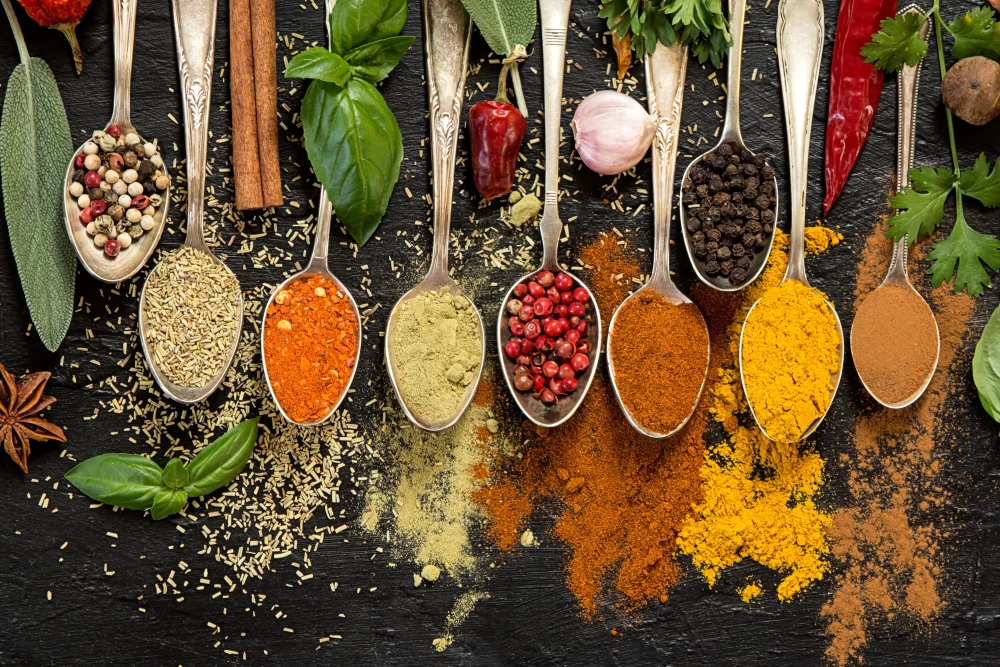
- 25th March 2023
Table of Contents
What is Fatty Liver?
Fatty liver is a condition in which there is an excessive accumulation of fat in the liver cells. It is also known as hepatic steatosis, and it can be caused by various factors such as alcohol consumption, obesity, diabetes, and high cholesterol levels. Fatty liver can lead to inflammation and scarring of the liver tissue, which can result in serious health complications if left untreated. When it comes to managing fatty liver disease, dietary modifications play a crucial role. Incorporating herbs and spices into your diet can help alleviate inflammation in the liver and reduce oxidative stress. For instance, turmeric has potent anti-inflammatory properties that may improve insulin resistance and decrease fat buildup in the liver cells. Cinnamon is another spice that may lower blood sugar levels and improve lipid profile markers associated with fatty liver disease. Other beneficial herbs for fatty liver include ginger, garlic, dandelion root tea, milk thistle extract, artichoke leaf extract, licorice root extract among others. These herbs have been shown to protect against oxidative stress damage on the body's cells while promoting healthy digestion processes essential for optimal organ function.
Benefits of Herbs and Spices
Herbs and spices are not only flavorful, but they also provide numerous health benefits. Incorporating these ingredients into your fatty liver diet can improve digestion, reduce inflammation, and support overall liver function. Some of the best herbs and spices to include in your meals are turmeric, ginger, garlic, cinnamon, and cumin. Turmeric is known for its anti-inflammatory properties and has been shown to protect against liver damage. Ginger is another anti-inflammatory powerhouse that can soothe digestive issues such as nausea and bloating. Garlic contains compounds that stimulate the liver enzymes responsible for flushing out toxins from the body. Cinnamon helps regulate blood sugar levels which is important for individuals with fatty liver disease while cumin aids in digestion by increasing bile production. By incorporating these herbs and spices into your fatty liver diet you can enhance flavor while improving overall health. Additionally, using herbs and spices instead of salt or sugar will help you reduce sodium intake as well as control blood glucose levels which is important when managing a fatty liver condition.
Tips for Incorporating Herbs and Spices
1. Start with the basics: Adding herbs and spices to your diet is a great way to enhance the flavor of your food without adding extra calories or unhealthy ingredients. For example, using fresh herbs such as parsley or cilantro can add a bright and fresh taste to salads or soups, while dried spices like cumin or smoked paprika can add depth and complexity to meat dishes.
2. Experiment with different combinations: Don't be afraid to mix and match different herbs and spices in your cooking. Some classic pairings include rosemary with lamb, thyme with chicken, and basil with tomato-based dishes. You can also try creating your own spice blends by combining complementary flavors like cinnamon, nutmeg, cloves, and ginger for a warm and comforting taste.
3. Use herbs and spices as substitutes: When cooking for a fatty liver diet, it's important to avoid ingredients that are high in fat or sugar. Luckily, many herbs and spices can be used as healthy substitutes for these less desirable ingredients. For example, using garlic instead of salt can add flavor without increasing sodium levels in the body, while cinnamon can be used instead of sugar to sweeten foods naturally.

Common Herbs and Spices to Use
Herbs and spices are not only great at adding flavor to your meals, but they also have numerous health benefits that can assist in managing fatty liver disease. One of the most commonly used herbs is turmeric, which contains curcumin that has anti-inflammatory effects on the liver. Other herbs like ginger and garlic also possess anti-inflammatory properties that can reduce inflammation caused by fatty liver disease. Incorporating herbs like dandelion and milk thistle in your diet can help improve liver function while promoting detoxification. These herbs contain compounds that support the liver's ability to break down toxins, helping to prevent further damage to the liver. Spices such as cinnamon have been shown to improve insulin sensitivity, which is important for those with fatty liver disease since it is often associated with insulin resistance. Additionally, research has linked cumin consumption with improved lipid profiles and reduced inflammation markers- both beneficial for those suffering from fatty liver disease. Overall, incorporating a variety of herbs and spices into your diet can be a simple yet effective way to manage fatty liver disease.
Preparing Meals with Herbs & Spices
Herbs and spices are an excellent way to add flavor to your meals, especially when you're following a fatty liver diet. However, it's crucial to choose the right herbs and spices that will not trigger inflammation or worsen your symptoms. Turmeric is one of the most recommended options due to its anti-inflammatory properties, and it can be added to soups, stews or as a marinade for meats. Ginger is another great spice that also helps reduce inflammation while improving digestion. For those who love herbs, cilantro and parsley are excellent choices for their detoxifying properties; they can be used in salads or as toppings on different dishes. Rosemary has antioxidant effects that protect liver cells from damage and can be used with roasted vegetables or baked chicken breasts. Additionally, garlic is packed with health benefits and can help lower triglyceride levels in the blood. Lastly, when adding herbs or spices into your food preparation routine, consider buying them fresh instead of dried versions because they have maximum nutrients content that will benefit your overall health more than processed versions would do.
Supplements for Fatty Liver
Supplements can support the treatment of fatty liver and improve liver function. Milk thistle is a popular supplement that contains silymarin, an antioxidant that helps protect the liver from damage caused by free radicals. It also supports liver cell regeneration and reduces inflammation in the liver. Turmeric is another supplement that has anti-inflammatory properties, which can help reduce inflammation in the liver and promote healing. Curcumin, found in turmeric, also aids digestion and improves bile flow. Incorporating herbs and spices into a fatty liver diet is an easy way to add flavor while benefiting from their health properties. Cinnamon has been shown to improve blood sugar control, which can help prevent further damage to the liver caused by diabetes or insulin resistance. Dandelion root tea can help detoxify the liver by increasing bile production and improving digestion. Rosemary contains rosmarinic acid, which has antioxidant properties that protect against oxidative stress in the liver. Adding supplements and herbs into your diet should not replace standard medical treatment for fatty liver disease but rather complement it with added benefits for overall health improvement.
Conclusion
In conclusion, incorporating herbs and spices into your fatty liver diet is a simple yet effective way to improve your overall health. Not only do they add flavour and variety to meals, but many herbs and spices also have anti-inflammatory properties that can help reduce liver inflammation. Additionally, several studies have shown that certain herbs and spices can even promote liver function. It's important to note that while herbs and spices are beneficial for those with fatty liver disease, they should not be relied upon as the sole treatment method. A healthy lifestyle that includes regular exercise and a balanced diet is crucial for managing this condition. If you're unsure about how to incorporate more herbs and spices into your meals or have any concerns about your fatty liver disease, consult with a healthcare professional for personalised advice.














